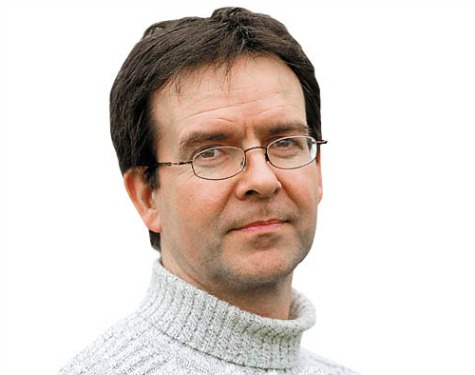 Just as there is nothing more satisfying for an athlete – to use the term in its broadest sense – than to win an Olympic gold medal, there is nothing more satisfying for a journalist – ditto – than to document the career of that athlete.
Just as there is nothing more satisfying for an athlete – to use the term in its broadest sense – than to win an Olympic gold medal, there is nothing more satisfying for a journalist – ditto – than to document the career of that athlete.
It's a ludicrous premise in a way. When the winning blow is struck, or the line crossed, the victory belongs to the protagonist, with lessening versions of credit accruing to their coach, psychologist, nutritionist, pharmacist – sorry, forget that last one.
But there is no getting away from it – in the moment of victory, one cannot help but rejoice the more if one has invested hours in speaking to the eventual winner and writing about them.
At the London 2012 Olympics that – thank the Lord – have just concluded with such success (the event which the Evening Standard gloomily warned on its front page would be the "Wettest Games on record" took place for the most part in glorious sunshine), there were clear examples of this truth.
Speaking personally, the second Saturday of the Games is still something I have to remind myself actually happened, rather than being something from a kind of hometown reverie.
Before spending the evening in dizzy contemplation of three home athletics golds in the space of an hour – pinch me someone – I had taken the trip down to Eton Dorney.
At the rowing venue since re-named Eton Adorney following the home successes there during the Games – not really – I watched the home team double its number of golds to four as the men's coxless four and the lightweight women's double scull of Katherine Copeland and Sophie Hosking crossed the line of foaming bubbles ahead of all opposition between two mountains of patriotic fervour.
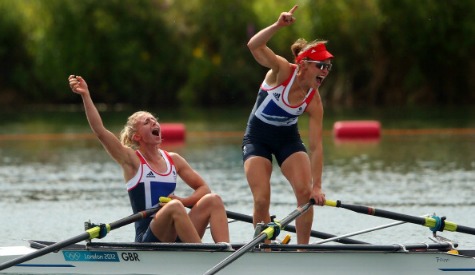 It was stirring to witness the relatively new pairing win their title. But the victory which reverberated most was the one earned by the four which had been put together earlier in the year by the men's head coach, Jürgen Gröbler, after it became clear that Andy Triggs Hodge and Pete Reed, both Olympic champions in the 2008 four, were not going to find a way to get past the New Zealand pair who eventually won the 2012 Olympic title, Hamish Bond and Eric Murray.
It was stirring to witness the relatively new pairing win their title. But the victory which reverberated most was the one earned by the four which had been put together earlier in the year by the men's head coach, Jürgen Gröbler, after it became clear that Andy Triggs Hodge and Pete Reed, both Olympic champions in the 2008 four, were not going to find a way to get past the New Zealand pair who eventually won the 2012 Olympic title, Hamish Bond and Eric Murray.
In the course of the previous four years I had seen and spoken to the British pair and charted – along with many others – an emotional graph that had begun with soaring hope, then dipped to despair and frustration before rising to joy.
Early in 2009, Reed had announced at a press event next to the Tower of London that he would definitely be seeking a second Olympic gold, and had spoken in confident tones about what he and his mate from Molesey might be able to accomplish at the coming home Games.
Two years – and successive defeats going into double figures – later, Reed and Triggs Hodge spoke about having "a mountain to climb" in London after enduring yet another demoralising defeat by the Kiwi pair at the world championships.
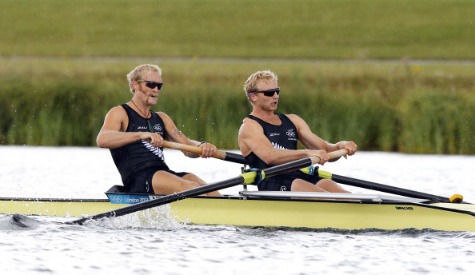 In the event, Gröbler switched the party from one mountain to another, and roped the increasingly despondent pair up with their old team mate from Beijing, Tom James, and Alex Gregory, who could be viewed either as the newcomer in the boat, or the only remaining inhabitant remaining from the crew which had won the world title in 2011.
In the event, Gröbler switched the party from one mountain to another, and roped the increasingly despondent pair up with their old team mate from Beijing, Tom James, and Alex Gregory, who could be viewed either as the newcomer in the boat, or the only remaining inhabitant remaining from the crew which had won the world title in 2011.
Before the British trials, where everything was about to be thrown into the pot as far as the men's four was concerned, Gregory has spoken with cautious optimism about his hopes of getting a place in the newly-minted "flagship" crew that would receive Gröbler's particular personal attention for the home Games.
"He has got a huge history of success with his methods, he's proved his coaching ability over so many years now, and I want to be coached by him in an Olympic year," Gregory said.
"It is also a boat with a glorious history for Britain – the coxless four has taken three successive Olympic golds, so to be in the crew that earned a fourth gold would be really exciting, and to do that on a home course would be even more incredible."
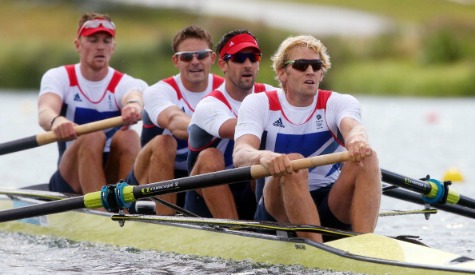 Gregory had narrowly missed out on Olympic selection in 2008 but went to Beijing as a reserve and watched all the action from the stands.
Gregory had narrowly missed out on Olympic selection in 2008 but went to Beijing as a reserve and watched all the action from the stands.
He described that experience as "a turning point" in his rowing career.
"In many ways it was a frustrating experience, and it came after a long run of injuries and disappointments for me," he said. "But sitting on the sidelines and watching the guys I had trained and raced with collecting their medals made me feel even more committed to the sport.
"When I used to be asked about my ambition, I always used to say it was to win an Olympic gold medal. That's what you say, isn't it? But I know now what the Games feel like, and I have experienced that atmosphere and emotion.
"When Mark Hunter won the lightweight double scull gold with Zac Purchase, I was sitting right behind his brother and his dad and I saw how much it meant to them. They had tears streaming down their faces and they were hugging each other – I can feel myself welling up right now just thinking about it.
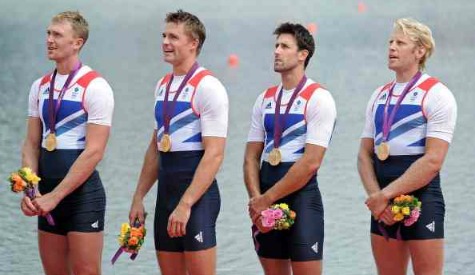 "That made me realise what it would mean to my family and friends if I could win an Olympic gold."
"That made me realise what it would mean to my family and friends if I could win an Olympic gold."
And so to see Gregory win his own gold was a rich experience. As he afterwards admitted with a rueful smile, he had suffered feelings of extreme nervousness ahead of the final, rooted in the conviction that if three gold medallists and a "newcomer" failed to retain the fours title, the difference would be perceived as the "newcomer".
As for Triggs Hodge and Reed, they had a golden feeling after four years in which it seemed increasingly likely they would reach this point with only grim smiles on their faces.
"I can only feel happy right now," said Reed. "Andy and I have had a tough Olympiad – it was a silver Olympiad, to be honest – and we had many trials and dark times."
To witness such sporting confirmations feels like a rare privilege.
By Mike Rowbottom
Source: www.insidethegames.biz
 The Spanish Super Cup remains delicately poised after Barcelona secured a 3-2 win against Real Madrid in a pulsating first leg.
The Spanish Super Cup remains delicately poised after Barcelona secured a 3-2 win against Real Madrid in a pulsating first leg.
 Yohan Blake ran the joint-third fastest time in 100m history as fellow Jamaican Usain Bolt eased to 200m victory in the Diamond League meeting in Lausanne.
Yohan Blake ran the joint-third fastest time in 100m history as fellow Jamaican Usain Bolt eased to 200m victory in the Diamond League meeting in Lausanne.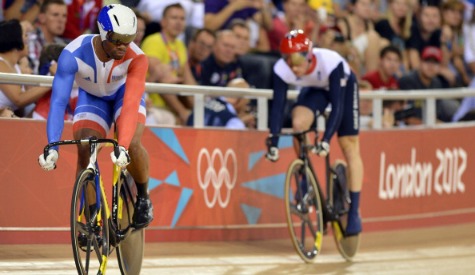 A new television channel showcasing Olympic sports, such as handball and cycling, is to be launched later this year in the hope of capitalising on the success of London 2012.
A new television channel showcasing Olympic sports, such as handball and cycling, is to be launched later this year in the hope of capitalising on the success of London 2012. 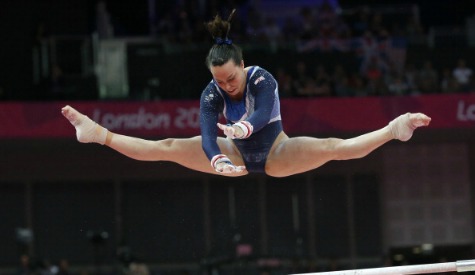 "The London Olympics has brilliantly demonstrated the huge desire amongst the British public to watch sports which don't normally get the showcase on British TV that they deserve.
"The London Olympics has brilliantly demonstrated the huge desire amongst the British public to watch sports which don't normally get the showcase on British TV that they deserve.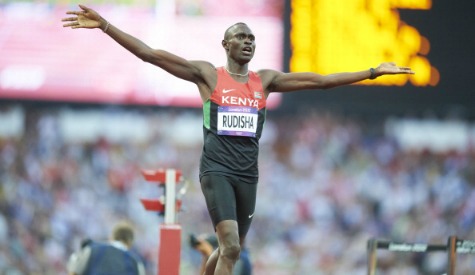 Kenyan President Mwai Kibaki has ordered an inquiry into the country's disappointing performance at London 2012, where the team won 11 medals, including two gold.
Kenyan President Mwai Kibaki has ordered an inquiry into the country's disappointing performance at London 2012, where the team won 11 medals, including two gold. 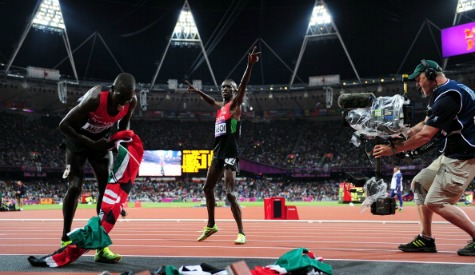 Kirwa claimed that NOCK officials tried to dictate athletes' training schedules and tried to sideline the coaches, who he claimed are now being unfairly blamed for the relatively poor performance in London.
Kirwa claimed that NOCK officials tried to dictate athletes' training schedules and tried to sideline the coaches, who he claimed are now being unfairly blamed for the relatively poor performance in London. Just as there is nothing more satisfying for an athlete – to use the term in its broadest sense – than to win an Olympic gold medal, there is nothing more satisfying for a journalist – ditto – than to document the career of that athlete.
Just as there is nothing more satisfying for an athlete – to use the term in its broadest sense – than to win an Olympic gold medal, there is nothing more satisfying for a journalist – ditto – than to document the career of that athlete. It was stirring to witness the relatively new pairing win their title. But the victory which reverberated most was the one earned by the four which had been put together earlier in the year by the men's head coach, Jürgen Gröbler, after it became clear that Andy Triggs Hodge and Pete Reed, both Olympic champions in the 2008 four, were not going to find a way to get past the New Zealand pair who eventually won the 2012 Olympic title, Hamish Bond and Eric Murray.
It was stirring to witness the relatively new pairing win their title. But the victory which reverberated most was the one earned by the four which had been put together earlier in the year by the men's head coach, Jürgen Gröbler, after it became clear that Andy Triggs Hodge and Pete Reed, both Olympic champions in the 2008 four, were not going to find a way to get past the New Zealand pair who eventually won the 2012 Olympic title, Hamish Bond and Eric Murray. In the event, Gröbler switched the party from one mountain to another, and roped the increasingly despondent pair up with their old team mate from Beijing, Tom James, and Alex Gregory, who could be viewed either as the newcomer in the boat, or the only remaining inhabitant remaining from the crew which had won the world title in 2011.
In the event, Gröbler switched the party from one mountain to another, and roped the increasingly despondent pair up with their old team mate from Beijing, Tom James, and Alex Gregory, who could be viewed either as the newcomer in the boat, or the only remaining inhabitant remaining from the crew which had won the world title in 2011. Gregory had narrowly missed out on Olympic selection in 2008 but went to Beijing as a reserve and watched all the action from the stands.
Gregory had narrowly missed out on Olympic selection in 2008 but went to Beijing as a reserve and watched all the action from the stands. "That made me realise what it would mean to my family and friends if I could win an Olympic gold."
"That made me realise what it would mean to my family and friends if I could win an Olympic gold." Juliette John, a former athlete and relative of some of the young T&T cyclists, yesterday expressed frustration with what she regards as poor support for the athletes from the T&T Cycling Federation (TTCF).
Juliette John, a former athlete and relative of some of the young T&T cyclists, yesterday expressed frustration with what she regards as poor support for the athletes from the T&T Cycling Federation (TTCF).